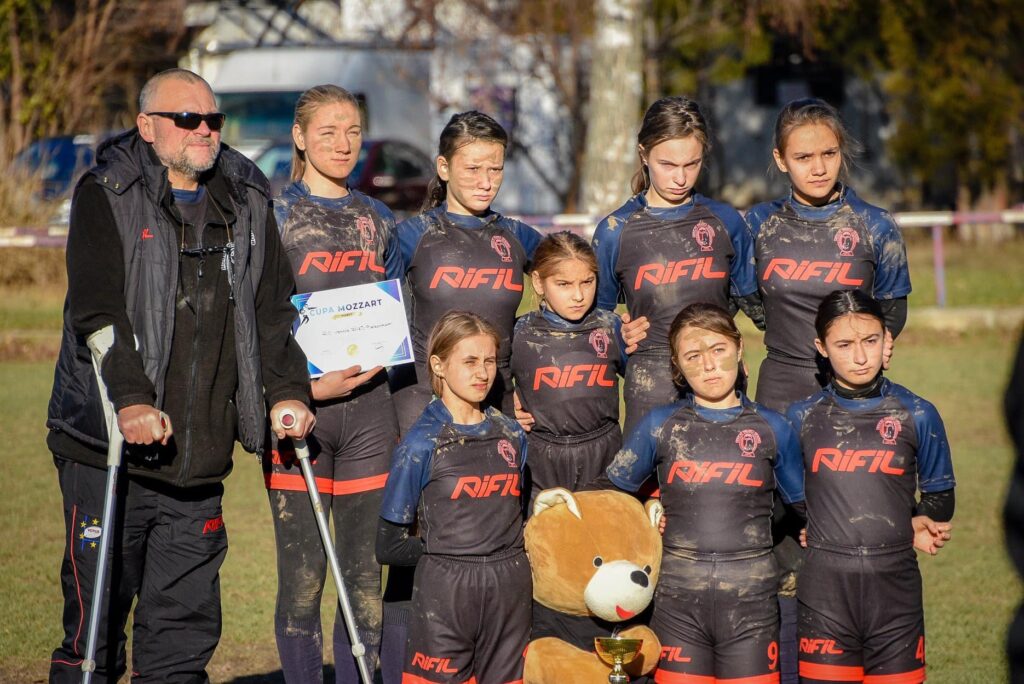Clubul Rugby Venus Piatra Neamț
The first women’s rugby team in Romania was founded in Piatra Neamț 22 years ago by Professor Eusebiu Popa. The idea came to him in 1996 while attending a tournament in Italy with a boys’ team. The official affiliation with the Romanian Rugby Federation was signed on August 12, 1996.
For over 20 years, Temad has supported the VENUS – Mațele Negre rugby team, and we are honored to stand by such a dedicated and big-hearted person as Professor and Coach Eusebiu Popa.
2022 – A Special Year for #matzelenegre

“If there’s still anyone among those reading and following our blog who doesn’t know what the Venus RIFIL women’s rugby club represents for Neamț County and youth rugby in Romania, perhaps it’s time to once again highlight the most important milestones of the first women’s rugby club in Romania. Recognized more abroad and across the country than at home, #matzelenegre has now become a national brand, a way of life, and an inspiration for all children who aspire to play professional sports.
The club’s domestic record is the history of an organization that opened the book on women’s rugby in Romania. This includes national senior champion titles in 2005 and 2006, national senior runner-up titles in 2007 and 2008, third place at the junior level in 2013, fourth place in 2012, and winning the U14 regional junior championship in the 2016-2017 season. Today, Venus Club RIFIL boasts players on Romania’s national team and in top league clubs, such as Loredana Juncanariu, Georgiana Gabor, Diana Mândrilaș, and Irina Hîrjete, who is also the first Romanian commissioner in the European rugby system. The current roster of Rugby Club Venus RIFIL includes: Paula Ciorobâtcă (assistant coach), Karina Lămătic, Izabela Barna, Maria Antonia Fulga, Alexandra Popa, Amalia Buftea, Adelina Turică, Ayana Pascal, Amalia Creangă, Georgiana Dobrică, Roxana Ungureanu, Ramona Nistoroaia, and Mădălina Creangă.
This year was truly special for us. We actively participated in tournaments held in various parts of the country, including Timișoara, Câmpia Turzii, Bucharest, Arad, Sighișoara, Brașov, Bârlad, and Gura Humorului. I am thrilled that we are increasingly being invited to tournaments, even outside Romania.
The Romanian Rugby Federation highlighted #matzelenegre under the ‘Club of the Week’ section. It was a joy, especially for the girls. The club also made significant strides in terms of public image, which was evident in the national, regional, and local media,” stated Professor Eusebiu Popa.
Sursă text: Comunicatul de presă emis de clubul Venus RIFIL din 30.12.2022.
25+ Years of Women’s Rugby in Romania
The first match against another girls’ team took place in December 1996 when we played Universitatea Cluj. “The opposing team even used a boy who was made up to look like a girl. My girls figured it out, and the best players took turns tackling him. They went in two at a time to handle him,” recalls Eusebiu Popa.
International Achievements

In 1997, two more teams emerged, one in Gura Humorului and another in Iași, leading to the organization of a regional championship. The Piatra Neamț team, wearing jerseys inspired by the famous Harlequins, often came out on top. Soon, international results began to surface.
“In 2000, we participated in the Heineken Rugby Seven tournament in Amsterdam, competing for third and fourth places. We were narrowly defeated by England’s champions, Richmond, with a score of 17-12. In 2006, we won a rugby-ten tournament in Ghent, Belgium. In 2015, we secured third place in Klagenfurt, Austria. Later, our ‘little cats’ won tournaments in Cusago, Italy, and Chișinău, Moldova, in 2016,” enumerates Eusebiu Popa, recalling the international successes of his team.

The first junior national championship was held in 2014, followed by the senior championship in 2015. In 2005 and 2006, Eusebiu Popa’s girls were champions; in the following two years, they were runners-up. Venus Piatra Neamț thus became the most decorated women’s team in Romania.
IIllness and Love for Rugby
In 2009, an aggressive form of diabetes slowed Eusebiu’s momentum. Despite health challenges, he continues to coach his “cats,” even after being hospitalized for three weeks.
“At my left foot, I no longer have any toes, and on my right foot, only two remain. Despite the struggles, rugby keeps me going,” he admits.

No Available Field in Piatra Neamț
“Now I only have girls under 14. They are 12-14 years old. This year, we won all 14 matches in a regional junior championship. Unfortunately, I can’t register for the championship now because of my health. I have to be selective with the competitions. Rifil is our sponsor, and they support us with equipment and transportation. Other sponsors, like TEMAD, also help with food packages for travel. We’ve been lucky to have people who understand and support us.”
International Transfers
In 2001, one player, Elena Roxana Aciocoiței, transferred to France to play for the Beauvais club near Paris.
Source: newsweek.ro
The Wonder Man – Eusebiu Popa

Professor EUSEBIU POPA – 25 YEARS OF WOMEN’S RUGBY IN ROMANIA
Eusebiu Popa is the kind of man for whom rugby has not only marked his life but also given it purpose and meaning. Despite undergoing 28 foot surgeries due to severe diabetes, he is kept on his feet by the sport he loves.
He moves with difficulty, sometimes using a stool to rest or leaning on crutches during training sessions, but he refuses to give up. Rugby is his entire life.
His rugby journey began seemingly by chance. Like most 15-16-year-old boys, he played football, even as a goalkeeper for a while. One day, a neighbor asked if he wanted to try rugby, and he agreed.
At the local pool, where many children gathered, Professor Vasile Bogza and engineer Vasile Adascălului taught them the basics of the sport. Soon enough, he played his first match against the Pascani School Group team. Over time, he consolidated his position as a right prop, realizing that rugby was his true calling. This was a time when rugby was a popular sport: on the Săvinești Platform alone, there were two or three teams, and in Moldova, nearly every industrial complex or school group had a rugby team. Today, across the entire federation, there are only about 70-80 teams nationwide.
“I played until 1986, then joined the army. Shortly after, our rugby team was disbanded because Maria Gheorghe, the local official, disliked Professor Bogza, and the rugby grounds were replaced with an equestrian base. However, even while in the army, I couldn’t stay away from rugby. I would sneak away from my unit to join a local transport enterprise’s rugby team. After finishing my service, I followed the national team across the country, becoming somewhat of a mascot. I wanted to start a team in Piatra Neamț but only succeeded in 1991 while working at Mecanica Ceahlău. One day, I encountered some kids from School No. 12 practicing on a patch of grass. They were training independently, so I went to observe. I encouraged them to invite others to join. At the next training session on the Gospodine plateau, 30 kids showed up. We only had a plastic ball and no proper gear, with each child wearing whatever they could. This is how Venus was born on November 15, 1991. For two and a half years, we operated under the Youth Foundation before becoming independent.”
The team was built around the enthusiastic kids from School No. 12, later joined by students from Schools No. 3 and 4. The plastic ball was eventually replaced when the federation provided a “Cotton Oxford” ball. “The team captain would wash it with shampoo and sleep with it under his pillow,” Popa recalls.
“To see 20 kids playing rugby on the sand is fantastic!”
In 1992, the team traveled to Sibiu for their first away game, equipped with basic gear: jerseys, shorts, and socks. Finding suitable shoes was more challenging. Despite these limitations, Venus—a mere few months old—secured 5th place out of 8 teams. Other trips followed, often in labor transport trucks, sometimes with benches and tarpaulin covers. None of this mattered to the team.
One major disappointment occurred during their first away game when their treasured ball, freshly cleaned with shampoo, was stolen. Thankfully, the federation replaced it and began offering more substantial support to the team.
“In 1992, we also went to the seaside. To see 20 kids playing rugby on the sand is fantastic! That was the year we joined the National Junior Championship. I quit my job to fully dedicate myself to the club. In 1994, we participated in an international tournament in Rovigo, Italy, competing against 36 teams from Wales, Scotland, England, France, South Africa, and Taiwan. We didn’t embarrass ourselves, finishing mid-table. In 1996, I gathered 12 girls from the Economic High School and trained them at the pool. By May, we had established the first women’s rugby team in the country, fully affiliated with the federation. I maintained the same level of discipline as I did with the boys. In 1997, we hosted the first official women’s rugby match in Piatra Neamț, and the ITA Stadium was packed with curious spectators.”

Even in 2021, he managed to take the team to the seaside.
“I thank the girls (#mâtzelornegrerugby) … After 10 years, because of them, I finally managed to swim a little in the sea. The foot pain disappeared in the water. I’m so grateful you are truly #thefamilyofblackcatsrugby.”
For 20 years, not just Piatra Neamț but all of Romania and even abroad have witnessed women’s rugby. Essentially, Eusebiu Popa raises young girls—including his youngest daughter, who is part of the “Black Kittens” team—teaching them to spend their free time productively rather than in front of screens.
Source: mesagerulneamt.ro






